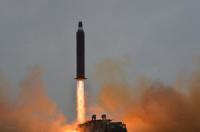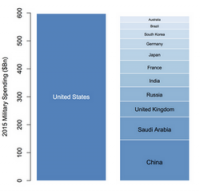-
Efforts to prevent alternative methods of border crossing need better monitoring: GAO
As DHS has increased the security of overland smuggling routes, transnational criminal organizations have adapted their techniques to smuggle drugs and humans through alternative methods. These methods include cross-border tunnels, ultralight aircraft, panga boats, and recreational maritime vessels. GAO says that while these methods account for a small proportion of known smuggling, they can be used to transport significant quantities of drugs or for terrorist activity.
-
-
Rewriting NAFTA has serious implications beyond just trade
President Donald J. Trump has called the North American Free Trade Agreement (NAFTA) our “worst trade deal.” After flip-flopping between scrapping NAFTA altogether and saying that the agreement required only tweaks, Trump is trying to force a renegotiation of a deal that supports three million American jobs. This may seem like just another trade dispute, but NAFTA has bound together North America’s economic and security considerations. The renegotiation of NAFTA may thus have serious implications not only for trade and the continental economy, but also for immigration and border security. Bad deal or not, NAFTA has fundamentally reshaped North America’s immigration and security policies. Any changes to NAFTA will certainly have repercussions that reach far beyond the economy.
-
-
Russia’s hacking, disinformation efforts aim to influence German, French elections

Russian government hackers and disinformation specialists were successful in their hacking and disinformation campaign in the run-up to the November 2016 election in the United States. “I think one of the lessons that the Russians may have drawn from this is that this works,” FBI director James Comey told lawmakers on Tuesday. German and French intelligence services agree with Comey. They say they have detected an intensification of Russian hacking and disinformation efforts in the run-up of the second round of France’s presidential election – to be held this coming Sunday – and Germany’s federal election, to be held in September. In both Francde and Germany, Russia’s campaign aims to strengthen populist, far-right, ultra-nationalist, and anti-American politicians and parties.
-
-
The lessons on Russian intelligence
Despite President Trump’s saying that it’s all just “fake news,” James R. Clapper, who was U.S. director of national intelligence from 2010 until January, said he has no doubt that Russia successfully interfered in the 2016 election and “clearly favored” Trump over Hillary Clinton. “Clearly, the Russians — and the shots were called at the highest level — were interested first in sowing dissension and doubt and discord in this country,” Clapper said. As the campaign went on, however, he said their aims switched to helping Trump. “They, too, didn’t initially take Mr. Trump seriously, but later on they did,” Clapper said at a Harvard Kennedy School talk. Clapper said we should expect more Russian meddling in U.S. elections.
-
-
U.S. border agents illegally turning away asylum seekers at U.S. border: Report
Human Rights First on Wednesday released a new report documenting dozens of instances in which U.S. border agents illegally turned away asylum seekers from the U.S. southern border. “We’ve documented dozens of cases in which individuals seeking protection from violence and persecution have been unlawfully turned away. These actions by U.S. border agents not only violate U.S. laws and treaty commitments, but put individuals’ lives in danger by sending them into the hands of persecutors, traffickers, or cartels,” said the lead researcher on the report.
-
-
New evidence shows pattern of Assad regime’s use of nerve agents
New evidence supports the conclusion that Syrian government forces have used nerve agents on at least four occasions in recent months: on 4 April 2017, in a chemical attack on Khan Sheikhoun that killed at least ninety-two people, and on three other occasions in December 2016 and March 2017, Human Rights Watch said in a report released yesterday. These attacks are part of a broader pattern of Syrian government forces’ use of chemical weapons. The attacks are widespread and systematic, and in some cases have been directed against the civilian population. As part of the evidence showing these attacks have become widespread and systematic, the detailed 48-page report identifies the three different systems being used by the Assad regime to deliver chemical weapons.
-
-
ISIS militants apologized to Israel after exchange of fire: Former Israel defense minister
Last November, ISIS-affiliated fighters apologized” to Israel after attacking Israeli soldiers on the Golan Heights. Israel’s former defense minister Moshe Ya’alon referred to an incident in which Islamist militants affiliated with ISIS exchanged fire with Israeli soldiers on patrol along the Israel-Syria border.
-
-
NK, currently with 13-30 nukes, is expanding its arsenal by 3-5 weapons per year

As of the end of 2016, North Korea is estimated to have 33 kilograms of separated plutonium and between 175 and 645 kilograms of weapon-grade uranium. If North Korea would use 70 percent of its estimated stock of weapon-grade uranium and plutonium to produce nuclear weapons, it would have between 13 and 30 such weapons, depending on their yield. David Albright of the Institute for Science and International Security says that based on this cumulative estimate, North Korea is currently expanding its nuclear weapons at a rate of about 3-5 weapons per year.
-
-
German populist, far-right party fails to bar scholar from criticizing it

A court in Dresden, Germany, earlier today (Friday) dismissed a law suit against Steffen Kailitz, a well-known political scientist, bringing to an end months of legal skirmish over comments he made about the populist, far-right National Democratic Party (NPD). NPD officials had asked the court to issue an injunction to block Kailitz from saying that the party planned racially motivated crimes against the state.” Kailitz, in an article last April, also wrote that the NPD wants to “expel 8 to 11 million people from Germany, including several million German nationals with immigrant backgrounds.”
-
-
Explosions rock Damascus Airport following cargo flights from Iran
Explosions rocked the area near Damascus International Airport early Thursday morning following the arrival of four cargo planes from Iran. Israeli leaders have said that Hezbollah receiving game-changing weapons, such as advanced missiles or chemical weapons, represents a “red line” that Israel will not accept.
-
-
Cyber attacks ten years on: from disruption to disinformation
Today – 27 April — marks the tenth anniversary of the world’s first major coordinated “cyberattack” on a nation’s internet infrastructure: Russian government hackers attacked the computer systems of the government of Estonia in retaliation for what Russia considered to be an insult to the sacrifices of the Red Army during the Second World War. This little-known event set the scene for the onrush of cyber espionage, fake news, and information wars we know today. A cybersecurity expert recently told the Senate Select Committee on Intelligence that to understand current Russian active measures and influence campaigns — that is, to understand cyber operations in the twenty-first century – we must first understand intelligence operations in the twentieth century. Understanding the history of cyber operations will be critical for developing strategies to combat them. Narrowly applying models from military history and tactics will offer only specific gains in an emerging ecosystem of “information age strategies.” If nations wish to defend themselves, they will need to understand culture as much as coding.
-
-
Empowering ISIS opponents on Twitter
A new RAND report draws on earlier RAND research on how to leverage social-media influencers and tailor messages to design a data-driven, actionable strategy to counter ISIS on Twitter. While social media is still relatively new, many of the best practices for using it are based on well-understood marketing approaches – and countering ISIS on social media should be informed by these best practices.
-
-
Local, federal focus on deadly gang violence on Long Island
There has been a surge since 2014 in the number of unaccompanied minors coming to the United States, mostly from El Salvador, Guatemala, and Honduras. Most of the minors are entitled to federal anti-trafficking protections, and subsequent resettlement. Suffolk Country is ranked fourth in the U.S. in the number of unaccompanied minors resettled in the county, and neighboring Nassau County ranks tenth. Violent gangs such as MS-13 actively recruit these unaccompanied minors. Local and federal leaders say there is a need to do more – from better vetting to gang prevention programs to better law enforcement – to address the growing gang violence.
-
-
World military spending: Increases in the U.S., Europe, decreases in oil-exporting countries

Total world military expenditure rose to $1686 billion in 2016, an increase of 0.4 percent in real terms from 2015, according to new figures from the Stockholm International Peace Research Institute (SIPRI). Military spending in North America saw its first annual increase since 2010, while spending in Western Europe grew for the second consecutive year.
-
-
Populism, terrorism converge to compound global risks
Aon publishes 2017 Risk Maps for Political Risk, Terrorism and Political Violence shows there has been a 14 percent increase in the number of terrorist attacks worldwide in 2016, up to 4,151 from 3,633 in 2015. Western countries saw a 174 percent increase in terrorist attacks in 2016, up from 35 attacks in 2015 to 96 attacks in 2016. Oil and gas companies were the target of 41 percent of terrorist attacks on commercial interests in 2016 and the trend has continued in 2017. But 2017 marks the first year in the last four where as many countries experienced a decline in political risk for investors as those experiencing an increase. This suggests a modest improvement in economic resilience after many years of deterioration. The potential for divergence between the United States and Europe around sanctions regimes could create uncertainty for investors in Iran, Russia, and even Cuba.
-
More headlines
The long view
What Does Netflix’s Drama “Adolescence” Tell Us About Incels and the Manosphere?
While Netflix’s psychological crime drama ‘Adolescence’ is a work of fiction, its themes offer insight into the very real and troubling rise of the incel and manosphere culture online.
A Shining Star in a Contentious Legacy: Could Marty Makary Be the Saving Grace of a Divisive Presidency?
While much of the Trump administration has sparked controversy, the FDA’s consumer-first reforms may be remembered as its brightest legacy. From AI-driven drug reviews to bans on artificial dyes, the FDA’s agenda resonates with the public in ways few Trump-era policies have.
The Center Can Hold — States’ Rights and Local Privilege in a Climate of Federal Overreach
As American institutions weather the storms of executive disruption, legal ambiguity, and polarized governance, we must reexamine what it means for “the center” to hold.
How to Reverse Nation’s Declining Birth Rate
Health experts urge policies that buoy families: lower living costs, affordable childcare, help for older parents who want more kids
Foundation for U.S. Breakthroughs Feels Shakier to Researchers
With each dollar of its grants, the National Institutes of Health —the world’s largest funder of biomedical research —generates, on average, $2.56 worth of economic activity across all 50 states. NIH grants also support more than 400,000 U.S. jobs, and have been a central force in establishing the country’s dominance in medical research. Waves of funding cuts and grant terminations under the second Trump administration are a threat to the U.S. status as driver of scientific progress, and to the nation’s economy.
The True Cost of Abandoning Science
“We now face a choice: to remain at the vanguard of scientific inquiry through sound investment, or to cede our leadership and watch others answer the big questions that have confounded humanity for millennia —and reap the rewards.”
